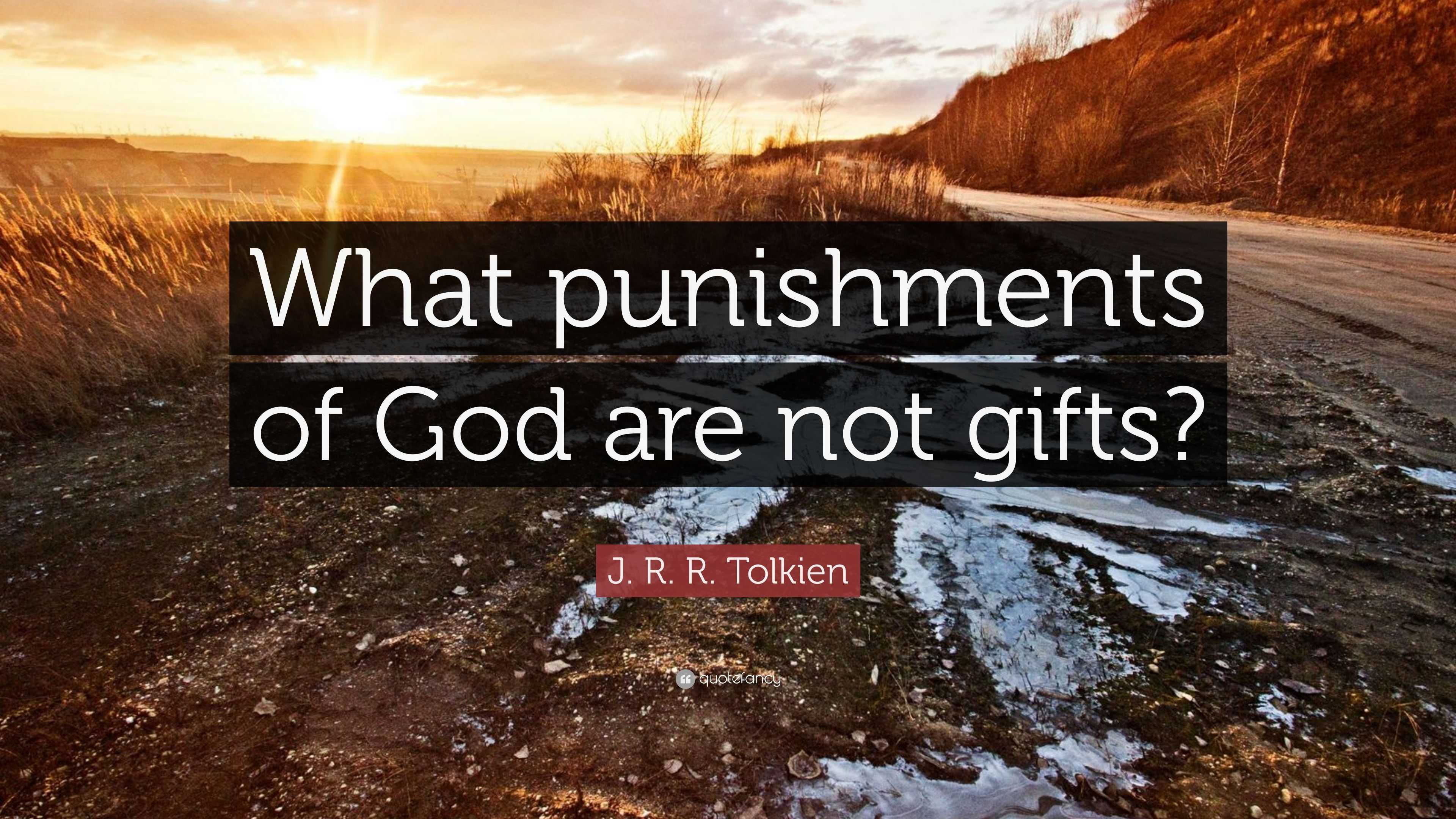Have you ever stopped to think about the punishments of God and whether they’re truly gifts in disguise? It’s a question that has sparked debates among theologians, philosophers, and even everyday people who seek meaning in life’s trials. The concept of divine punishment can be heavy, but what if some of these so-called punishments are actually blessings in disguise? Stick with me here, because we’re about to explore this intriguing topic together.
When we talk about the punishments of God, it’s easy to jump straight into fear mode. But hold up! What if these punishments are more complex than they seem? The Bible, along with other sacred texts, tells us that God’s ways are not our ways. Sometimes what feels like punishment might actually be a divine intervention designed to steer us toward growth, redemption, or even salvation. Let’s dig deeper into this idea and see how it shapes our understanding of God’s justice and mercy.
This article isn’t just about theology; it’s about finding meaning in the tough stuff. Whether you’re a believer, a skeptic, or just someone curious about the bigger picture, this discussion will give you plenty to chew on. So grab a cup of coffee, get comfy, and let’s unpack the idea of divine punishment—and whether it’s always a bad thing.
- Def Leppard Ballads A Journey Through The Heart Of Rock N Roll
- Dungy Son A Rising Star In The Spotlight
Here’s a quick roadmap of what we’ll cover:
- Biography of Key Figures
- Understanding Punishment in Religious Context
- Types of Punishments of God
- Are Punishments Ever Gifts?
- A Modern Perspective on Divine Justice
- The Psychological Impact of Believing in Divine Punishment
- Scriptural Evidence: What Do the Texts Say?
- Comparing Views Across Religions
- The Consequences of Rejecting Divine Punishment
- Conclusion: Finding Balance in Faith and Reason
Biography of Key Figures in Understanding Divine Punishment
Who Are the Thought Leaders Behind This Debate?
Before we dive into the meat of the topic, let’s take a moment to recognize some key figures who have shaped the discourse around divine punishment. From ancient theologians to modern thinkers, these individuals have left an indelible mark on how we interpret God’s justice.
| Name | Role | Key Contributions |
|---|---|---|
| St. Augustine | Early Church Father | Wrote extensively on sin, grace, and divine justice. |
| Thomas Aquinas | Scholastic Philosopher | Explored the nature of punishment as a means of restoration. |
| Martin Luther | Protestant Reformer | Emphasized God’s grace over punishment. |
| C.S. Lewis | Modern Apologist | Wrote about the paradox of divine punishment being a gift. |
These thinkers remind us that the conversation about divine punishment is centuries old, yet it remains as relevant today as it was back then.
- Famous March 2 Birthdays Celebrating The Stars Born On This Special Day
- Platform Clog Slippers The Ultimate Comfort You Deserve
Understanding Punishment in Religious Context
What Does Punishment Even Mean?
Let’s start by defining what we mean by punishment in a religious context. For many, it conjures images of fire and brimstone, but is that really the whole story? In most religious traditions, punishment serves a purpose—it’s not just random or arbitrary. It’s often seen as a corrective measure, designed to guide humanity back to the right path.
Here’s the kicker: punishment doesn’t always feel good in the moment, but that doesn’t mean it’s not serving a higher purpose. Think of it like a parent disciplining a child—sometimes tough love is necessary for growth.
Types of Punishments of God
Not All Punishments Are Created Equal
When we talk about the punishments of God, it’s important to recognize that there are different kinds. Here’s a breakdown of the main categories:
- Temporal Punishment: This refers to consequences that occur during our lifetime, like suffering, loss, or hardship.
- Eternal Punishment: Often associated with hell or separation from God, this is a more severe form of punishment that lasts beyond this life.
- Corrective Punishment: Designed to teach lessons and encourage personal growth, this type of punishment is more about restoration than retribution.
Understanding these distinctions can help us make sense of why certain events happen in our lives. Is it really just punishment, or is it an opportunity for transformation?
Are Punishments Ever Gifts?
When Trials Become Blessings
Now, here’s the million-dollar question: Can punishments from God ever be considered gifts? Believe it or not, the answer is yes. Many spiritual traditions teach that suffering can lead to profound personal growth, deeper faith, and a stronger connection to the divine.
Take Job from the Bible, for example. He faced unimaginable trials, yet his unwavering faith ultimately led to blessings far greater than what he lost. Sometimes, the hardest moments in life are the ones that shape us the most.
A Modern Perspective on Divine Justice
How Do We Reconcile Ancient Beliefs with Modern Values?
In today’s world, the idea of divine punishment can feel outdated or even harsh. But when we look at it through a modern lens, we start to see how it aligns with psychological and emotional growth. For instance, many people today view challenges as opportunities for self-improvement rather than pure punishment.
Studies have shown that those who embrace adversity with a positive mindset tend to experience greater resilience and fulfillment. So maybe God’s punishments aren’t so much about punishment as they are about pushing us to become better versions of ourselves.
The Psychological Impact of Believing in Divine Punishment
Does It Help or Harm Us?
Believing in divine punishment can have both positive and negative effects on our mental health. On one hand, it can provide a sense of purpose and meaning during difficult times. On the other hand, it can lead to fear, guilt, or even despair if taken too far.
Experts suggest that framing punishment as a gift can help mitigate these negative effects. By seeing trials as opportunities for growth, we can shift our mindset from fear to gratitude. It’s all about perspective, folks.
Scriptural Evidence: What Do the Texts Say?
Digging Into the Sacred Writings
If you’re looking for answers, the scriptures are a great place to start. Both the Bible and other sacred texts offer insights into God’s nature and how He interacts with humanity. Here are a few key passages to consider:
- “My thoughts are not your thoughts, neither are your ways my ways,” declares the Lord (Isaiah 55:8).
- “And we know that in all things God works for the good of those who love him” (Romans 8:28).
- “Every trial you have is common to all people. But God is faithful, and he will not let you be tried beyond what you are able to bear” (1 Corinthians 10:13).
These verses remind us that God’s ways are mysterious, but they are always working toward our ultimate good.
Comparing Views Across Religions
What Do Other Faiths Say?
While Christianity has a lot to say about divine punishment, other religions offer their own perspectives as well. For instance:
- Hinduism: Emphasizes karma, where actions in this life determine future outcomes.
- Buddhism: Focuses on suffering as a natural part of existence, with enlightenment as the ultimate goal.
- Islam: Teaches that Allah is merciful but also just, balancing punishment with forgiveness.
These diverse viewpoints show us that the concept of divine punishment is universal, even if the specifics vary between traditions.
The Consequences of Rejecting Divine Punishment
What Happens When We Say No?
Some might argue that rejecting the idea of divine punishment altogether is the way to go. But is it really that simple? Without the framework of divine justice, how do we make sense of life’s hardships? How do we find meaning in suffering?
Rejecting divine punishment doesn’t mean we escape the reality of pain—it just changes how we interpret it. Instead of seeing trials as opportunities for growth, we might see them as random or meaningless. And that, my friends, can be a whole different kind of burden.
Conclusion: Finding Balance in Faith and Reason
So, what have we learned about the punishments of God and whether they’re truly gifts? The short answer is: it depends on how you look at it. While some punishments may feel like pure hardship, others can lead to profound transformation and growth. It’s all about perspective—and trust.
As we navigate life’s ups and downs, let’s remember that God’s ways are not our ways. Even when things don’t make sense in the moment, there’s always the possibility that they’re part of a larger plan. So the next time you face a challenge, ask yourself: Could this be a gift in disguise?
And hey, don’t forget to leave a comment below sharing your thoughts on this topic. Or better yet, share this article with someone who might benefit from the discussion. Together, we can keep the conversation going—and maybe even find a little peace along the way.


